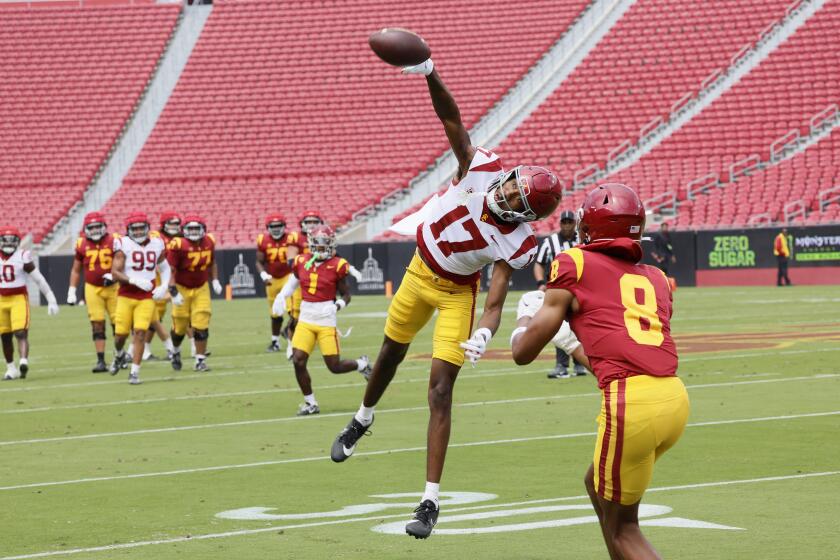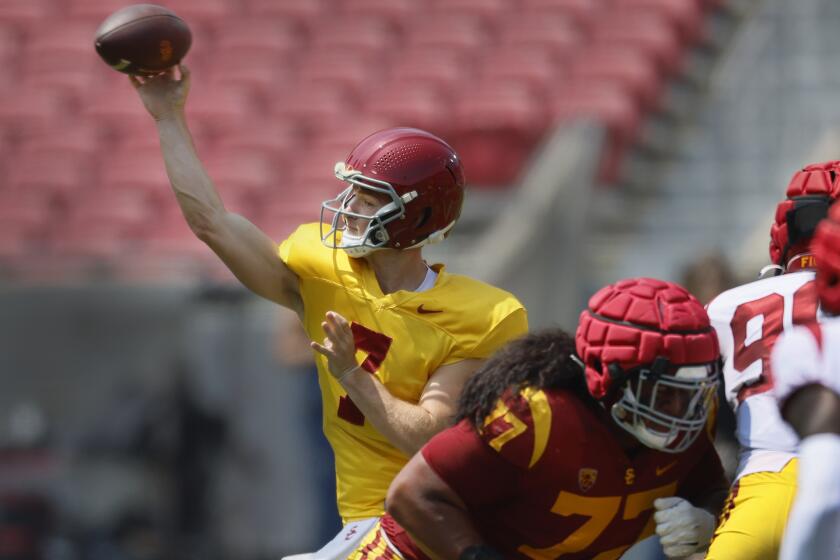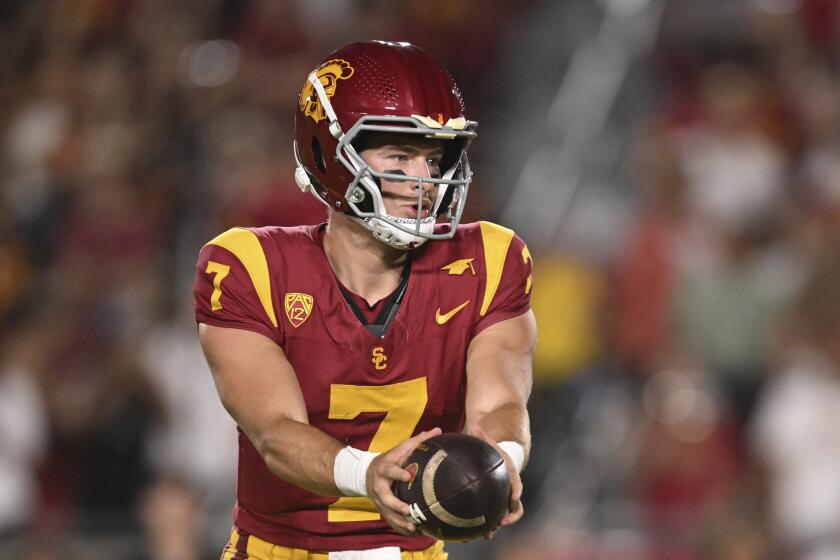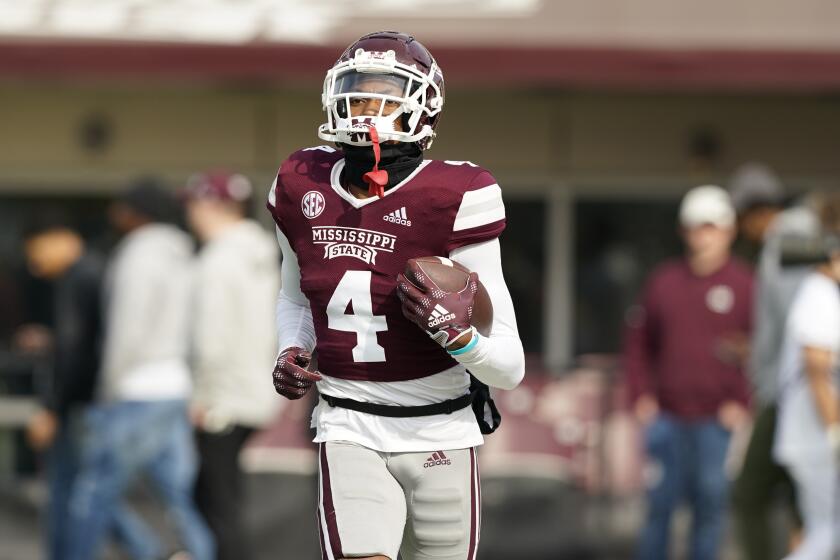Q&A with Pacific 10 Conference Commissioner Larry Scott
Larry Scott’s first year as Pacific 10 Conference commissioner was anything but boring. At the first game he attended, Oregon tailback LeGarrette Blount punched a Boise State player on national television. He has since presided over the NCAA probation of his league’s flagship football program, USC, and expanded the conference to 12 schools after a brazen bid to create a “Pac-16” failed.
A former Harvard tennis player, Scott came to the Pac-10 from the Women’s Tennis Assn., where he served as chairman and chief executive. Times’ national college football columnist Chris Dufresne recently interviewed Scott, on the eve of his second football season, at conference headquarters in Walnut Creek, Calif.
Here are the highlights of that conversation:
Is there a word to describe your first year as commissioner?
I would say “whirlwind.”
How much does USC going on probation hurt the league?
I actually think there’s a sense of relief down at USC, and here, at least there’s an end in sight.... I think people are ready to kind of deal with it, take their medicine, whatever it winds up ultimately being, and move on. USC will always be USC. They have a new administration, a new coach, and I think they’re looking for a fresh start.
Did you have a problem with the school hiring Lane Kiffin even as the NCAA was investigating possible violations at his former school?
I haven’t been consulted on any coaching searches.... I have a lot of confidence in the leadership of USC.... There were a lot of eyeballs on that decision, and multiple people at senior levels having conversations with Lane about expectations going forward.
You just wrapped up a highly hyped media blitz of the East Coast and still ended up with only two teams ranked in the USA Today coaches’ poll. The Atlantic Coast Conference had five teams ranked. Is that progress?
It reinforced in me the significance of the challenge that we have.... I think the Pac-10 does deserve more respect for its on-field and on-court success. I think that poll is indicative. I never looked at the East Coast media tour as some kind of silver bullet, that it overnight was going to turn around the culture about the conference.... This is kind of like turning a ship… this is going to be over a period of time.
The league also hired Creative Artists Agency to handle marketing strategies. Will CAA help in the next television contract and putting together a Pac-12 Network?
They’ve got a media advisory group really expert on advertising and TV negotiations. And they’ve got some folks that have particular expertise in devising business plans for networks.... That’s something we’re seriously looking at and exploring. We’re going to have a business plan for a Pac-12 Network. Whether we do it or not will depend on our negotiations, but we’ll be ready to do it.
What happened to the presidents of the league? They have traditionally been conservative. Suddenly, they give you a mandate to redraw the map?
I don’t think it’s anything I did to change the mentality of the presidents. The fact they recruited someone like myself from outside the industry was indicative of a new mind-set.
How much did the Big Ten Network and Southeastern Conference’s multibillion dollar deal with ESPN and CBS change the mind-set?
I think that essentially was the wake-up call.... They developed a pretty bold ambition of what they wanted the conference to be. And that’s what they presented to me when I was being recruited.
So a lot of this had to do with financial strain on schools?
Absolutely. There’s tremendous pressure financially. I don’t think what’s happening in the Pac-10 is very different from what’s going on across the country… I think the presidents said to themselves the Pac-10 still deserves to still be a leader, still be competitive, have the best coaches and facilities. We want to maintain broad-base commitment to sports. But we’re going to need to raise our revenue.
I think you caught everyone by surprise in June by making the bold play for half the schools in the Big 12. Was that totally out of the blue?
I didn’t have a game plan coming in as to what exactly we were going to do, but I knew the topics that would have to be addressed in the first 18 months…. The first six months I really didn’t make any changes whatsoever. I did do a lot of listening. I was mindful that I was an outsider to the industry, I’m not from the territory, and I spent a lot of time visiting campuses, listening, trying to understand what the level of the ambition was… Once I started making changes things seemed to happen quickly.
You ended up adding Utah and Colorado to the conference, but there’s a perception out there that Texas made you think they wanted to join but were only working for a better deal in the Big 12, which it got. Response?
I think that’s an easy way to tie ribbon around this whole thing… This thing would have not gotten to where it would have gotten, Nebraska leaving the Big 12, Colorado coming to us, if the goal was to leverage a better deal. The goal of Texas wasn’t to shrink the Big 12 to 10, I can assure you that.... Anyone who wants to look at this as Texas just kind of played a clever negotiating game I think is missing the plot.
So what happened with Texas? Why did they back out?
The only people who can give you that answer are the folks at Texas.... I think the support among the political appointees, the oversight for these schools, was probably too hot over the divide between Texas and Texas A&M. I think they were told the plug needed to be pulled on this.
How much does being a former athlete help you in your job?
I like the adrenaline flowing, and I’m very goal-orientated. Another thing I found about a role like this, having been an athlete at the collegiate as well as pro level also gives you some street cred with the coaches and student athletes as well.
The adrenaline must have really been pumping when you were flying around Texas in a private plane while writers tried to track your flight number.
It was exciting. The only sort of surreal part was when people were sort of following your every move. I hadn’t been through that type of intense scrutiny… I’ve joked to people that I know what it’s like to be a fugitive, people tracking the plane, like some Harrison Ford movie.
chris.dufresne@latimes.com
Go beyond the scoreboard
Get the latest on L.A.'s teams in the daily Sports Report newsletter.
You may occasionally receive promotional content from the Los Angeles Times.




